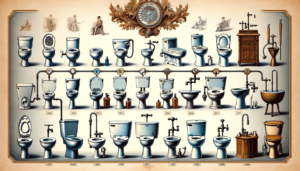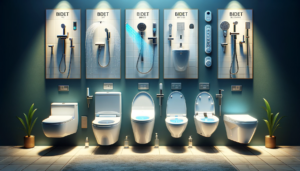Bidets vs. Toilet Paper: Weighing the Impact on Sewer Systems
The modern bathroom has long been dominated by the use of toilet paper. However, with the advent of bidets, particularly in countries like Japan and now increasingly in Australia, it’s crucial to consider their impact on our sewer systems. Unlike toilet paper, which disintegrates, bidets use water, which integrates more seamlessly with the sewage system. The use of toilet paper can lead to clogs and requires significant water to process in sewage plants. Conversely, bidets reduce the amount of solid waste in the system, potentially easing the strain on sewage processing.
Friend or Foe?
For septic tank owners, the introduction of a bidet can be a game-changer. Traditional toilet paper and wet wipes often do not decompose efficiently, leading to septic tank issues.
- Reduced Paper Waste: Bidets significantly cut down on the amount of toilet paper and wet wipes used. This reduction in paper waste is beneficial for septic tanks, as less solid material is less likely to cause blockages.
- Maintaining Bacterial Balance: Septic tanks rely on a delicate balance of bacteria to break down waste. The use of toilet paper, especially those not designed for septic systems, can disrupt this balance. Bidets help maintain this ecosystem by minimizing the introduction of foreign materials.
- Water Efficiency: Modern bidet toilet seats and standalone bidets are designed to be water-efficient. They use only the necessary amount of water for cleaning, which is crucial for maintaining the optimal functioning of a septic system.
- Preventing Overflows: One of the primary concerns with septic tanks is the risk of overflows or backups due to blockages. By reducing paper waste, bidets lessen the strain on the septic system, thereby preventing potential overflow issues.
- Long-Term Septic Health: Regularly using a bidet can contribute to the long-term health of your septic tank. By reducing the amount of non-biodegradable material (like wet wipes) and harsh chemicals, bidets help prolong the life and efficiency of septic systems.
- Compatibility with Septic Treatments: Bidets are generally compatible with most septic treatments and additives. They don’t introduce harsh chemicals that could disrupt the septic tank’s microbial balance.
- Economic Benefits: In addition to environmental advantages, using a bidet can save homeowners money on septic tank maintenance. Reduced blockages and smoother operation mean fewer calls to septic service professionals.
Can Bidets Save Your Plumbing (and the Planet)?
Switching to a bidet can have significant environmental and financial benefits. For one, bidets can drastically reduce toilet paper usage. It’s estimated that the average person uses approximately 20,000 sheets of toilet paper a year, which translates to gallons of water and numerous rolls of toilet paper. By reducing this demand, we not only save trees but also decrease the energy and water used in manufacturing paper products.
- Sustainable Water Usage: Bidets use a fraction of the gallons of water required to manufacture toilet paper. This efficient use of water is not only good for your plumbing but also for conserving global water supplies.
- Reducing Tree Harvesting: By lowering toilet paper usage, bidets contribute to saving forests. Fewer trees need to be cut down for paper products, aiding in environmental conservation.
- Energy Conservation: The production of toilet paper requires significant energy. Bidets reduce the demand for toilet paper, thus cutting down on the energy used in its production and transportation.
- Minimizing Chemical Pollution: Toilet paper production often involves bleaching and the use of other chemicals, which can be harmful to the environment. Bidets eliminate the need for such processes.
- Combatting Sewer Blockages: The use of bidets can help prevent blockages in sewer systems, often caused by flushable wipes and excessive toilet paper use. This leads to more efficient and less costly sewage management.
- Global Water Conservation: By reducing the need for toilet paper, bidets play a role in global water conservation efforts. They help in saving the gallons of water otherwise used in the production of paper products.
- Promoting Public Health: Cleanliness and hygiene are crucial for public health. Bidets offer a more hygienic alternative to toilet paper, potentially reducing the spread of bacteria and infections.
Myths and Misconceptions about Bidets and Sewage
There are several misconceptions about the impact of bidets on sewage systems.
- Myth of Excessive Water Use: A common myth is that bidets use more water than toilets. In reality, the water used by bidets is minimal compared to the gallons of water needed to produce a single roll of toilet paper.
- Misconception About Health Risks: Some believe that bidets might be less hygienic than toilet paper. However, bidets offer superior cleanliness, significantly reducing the likelihood of bacteria and germs spreading compared to traditional toilet paper.
- Belief in High Cost and Complexity: Many assume that installing a bidet is costly and complex. Modern bidet toilet seats and attachments are not only affordable but also easy to install, often requiring no more than a simple adjustment to your existing plumbing.
- Misunderstanding Bidet Impact on Plumbing: It’s often misunderstood that bidets could harm plumbing systems. However, bidets are designed to be compatible with standard plumbing and can actually reduce plumbing issues related to toilet paper clogs.
- Confusion Over Septic Safety: There’s a misconception that bidets are not safe for homes with septic systems. In reality, bidets are beneficial for septic systems as they reduce the amount of solid waste and toilet paper entering the tank.
- Assumption of One-Size-Fits-All: Some people think all bidets are the same. However, there are various types, from standalone bidets to electric bidets with multiple features, catering to different needs and preferences.
- Myth About Environmental Impact: A prevalent myth is that bidets could be environmentally harmful. Contrarily, bidets are eco-friendly, reducing the need for paper products and the associated environmental impact.
The Environmental Advantages of Using a Bidet
From an environmental perspective, bidets offer a sustainable alternative to toilet paper.
-
- Conservation of Trees: Bidets significantly reduce the need for toilet paper, thus conserving trees that would otherwise be cut down for paper production.
- Reduction in Water Usage: While bidets do use water, the amount is far less than what is used in the production of toilet paper. This reduction in water use helps conserve precious water supplies.
- Decrease in Energy Consumption: The manufacturing process for toilet paper is energy-intensive. By reducing toilet paper usage, bidets help decrease overall energy consumption.
- Lower Carbon Footprint: The reduction in the production, transportation, and disposal of toilet paper resulting from bidet use leads to a lower carbon footprint.
- Reduced Chemical Pollution: Paper production involves bleaching and other chemical processes. Bidets eliminate this need, thus reducing chemical pollution.
- Minimizing Sewer Blockages: By reducing reliance on toilet paper and flushable wipes, bidets help prevent blockages in sewer systems, leading to more efficient sewage management and reduced maintenance costs.
- Promoting Sustainable Habits: The use of bidets encourages a more sustainable lifestyle, reducing dependence on disposable products like toilet paper and wet wipes, which often end up in landfills or as litter in the environment.
Bidet Basics for Septic Tank Owners
For septic tank owners, using a bidet requires some basic knowledge for optimal performance.
- Select the Right Type: Choose between electric bidets and non-electric models based on your septic system’s capacity. Electric bidets offer more features but ensure your system can handle the additional water and electrical load.
- Regular Maintenance: Regularly clean and maintain your bidet to ensure it functions efficiently, using only the necessary amount of water and avoiding any undue strain on your septic system.
- Monitor Water Usage: Even though bidets are water-efficient, it’s crucial for septic tank owners to monitor overall water usage. Excessive water can overwhelm a septic system, so balance bidet use with other water-consuming activities.
- Avoid Harsh Chemicals: When cleaning your bidet, avoid harsh chemicals that can disrupt the bacterial balance in your septic tank. Opt for natural, septic-safe cleaning agents.
- Proper Installation: Ensure your bidet is correctly installed to prevent leaks and unnecessary water usage. Improper installation can lead to increased water flow, affecting the septic tank.
- Educate Household Members: Educate all household members on the proper use of the bidet to ensure it’s used efficiently, conserving water and reducing strain on the septic system.
- Consult with Septic Professionals: Before installing a bidet, consult with a septic system professional. They can advise on the best type of bidet for your specific septic system and any adjustments that may be needed.
How Bidets are Shaping the Landscape of Waste Management
 Bidets are revolutionizing the way we think about waste management. By reducing the reliance on toilet paper, they have a positive impact on sewer systems and septic tanks. This shift not only aids in managing our water supplies more effectively but also plays a crucial role in maintaining public health standards.
Bidets are revolutionizing the way we think about waste management. By reducing the reliance on toilet paper, they have a positive impact on sewer systems and septic tanks. This shift not only aids in managing our water supplies more effectively but also plays a crucial role in maintaining public health standards.
Bidets offer a multitude of benefits, both environmental and practical. They are instrumental in saving money, conserving water supplies, and reducing the environmental impact of paper waste. For those with septic systems, bidets can be a particularly wise investment, contributing to a healthier, more efficient waste management system. As we continue to explore sustainable living options, bidets stand out as a practical and eco-friendly choice. Join the bidet revolution today and make a positive impact on your plumbing and the planet!


